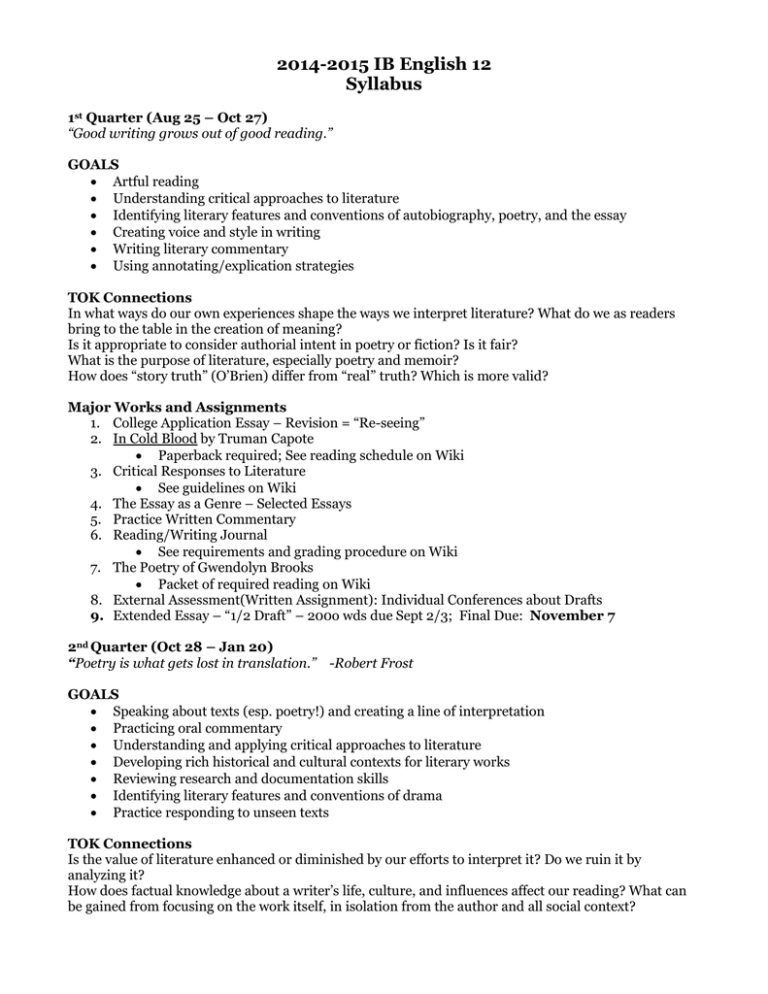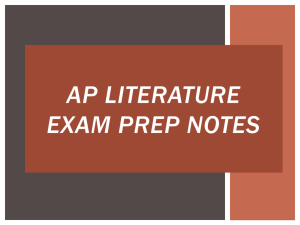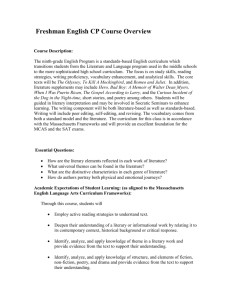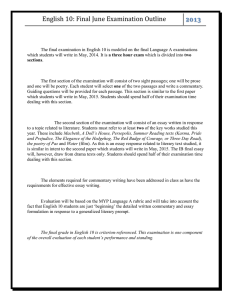Schedule 14
advertisement

2014-2015 IB English 12 Syllabus 1st Quarter (Aug 25 – Oct 27) “Good writing grows out of good reading.” GOALS Artful reading Understanding critical approaches to literature Identifying literary features and conventions of autobiography, poetry, and the essay Creating voice and style in writing Writing literary commentary Using annotating/explication strategies TOK Connections In what ways do our own experiences shape the ways we interpret literature? What do we as readers bring to the table in the creation of meaning? Is it appropriate to consider authorial intent in poetry or fiction? Is it fair? What is the purpose of literature, especially poetry and memoir? How does “story truth” (O’Brien) differ from “real” truth? Which is more valid? Major Works and Assignments 1. College Application Essay – Revision = “Re-seeing” 2. In Cold Blood by Truman Capote Paperback required; See reading schedule on Wiki 3. Critical Responses to Literature See guidelines on Wiki 4. The Essay as a Genre – Selected Essays 5. Practice Written Commentary 6. Reading/Writing Journal See requirements and grading procedure on Wiki 7. The Poetry of Gwendolyn Brooks Packet of required reading on Wiki 8. External Assessment(Written Assignment): Individual Conferences about Drafts 9. Extended Essay – “1/2 Draft” – 200o wds due Sept 2/3; Final Due: November 7 2nd Quarter (Oct 28 – Jan 20) “Poetry is what gets lost in translation.” -Robert Frost GOALS Speaking about texts (esp. poetry!) and creating a line of interpretation Practicing oral commentary Understanding and applying critical approaches to literature Developing rich historical and cultural contexts for literary works Reviewing research and documentation skills Identifying literary features and conventions of drama Practice responding to unseen texts TOK Connections Is the value of literature enhanced or diminished by our efforts to interpret it? Do we ruin it by analyzing it? How does factual knowledge about a writer’s life, culture, and influences affect our reading? What can be gained from focusing on the work itself, in isolation from the author and all social context? Major Works and Assignments 1. Hamlet by William Shakespeare Paperback required (Signet Edition recommended) Acts I-V Quizzes 2. Practice Oral Commentary 3. Reading/Writing Journal 4. More Poetry! Lake District Poets, War Poets, and Confessionalists 5. Critical Responses to Literature 6. External Assessment: Rough draft of Written Assignment due before Winter Break 7. Mid-Term Exams (Jan 12-16 ): Individual Oral Commentary & Discussion 3nd and 4th Quarters (Jan 21 – June 11) “A good essay must have this permanent quality about it; it must draw its curtain round us, but must be a curtain that shuts us in not out.” -Virginia Woolf GOALS Exploring the terminology and conventions of the novel and the short story Practicing written commentary on unseen texts Preparing a literary argument in a comparative essay Organizing and revising in timed writing settings Developing rich historical and cultural contexts for literary works TOK Connections Does familiarity with literature itself provide knowledge? If so, what kind? Knowledge of conventional forms? Knowledge of psychology? Of cultural history? Of oneself? When we read and write about literature, are we, in essence, creating knowledge? Is it true that in literature, there is really only one story and that writers, throughout time, have been telling it again and again in their own ways and through their own eyes? Major Works and Assignments 1. External Assessment: World Literature Written Assignment Due Feb 27 2. The Things They Carried by Tim O’Brien Book provided 3. Never Let Me Go by Kuzuo Ishiguru Paperback required; 4. “The Dead” by James Joyce Paperback or downloaded text required 5. Short Stories of Nadine Gordimer Stories provided 6. Critical Responses to Literature 7. Reading/Writing Journal 8. Exam Review Assignment IB Examinations: May 4 – 22 (See IB Wiki for Schedule)






